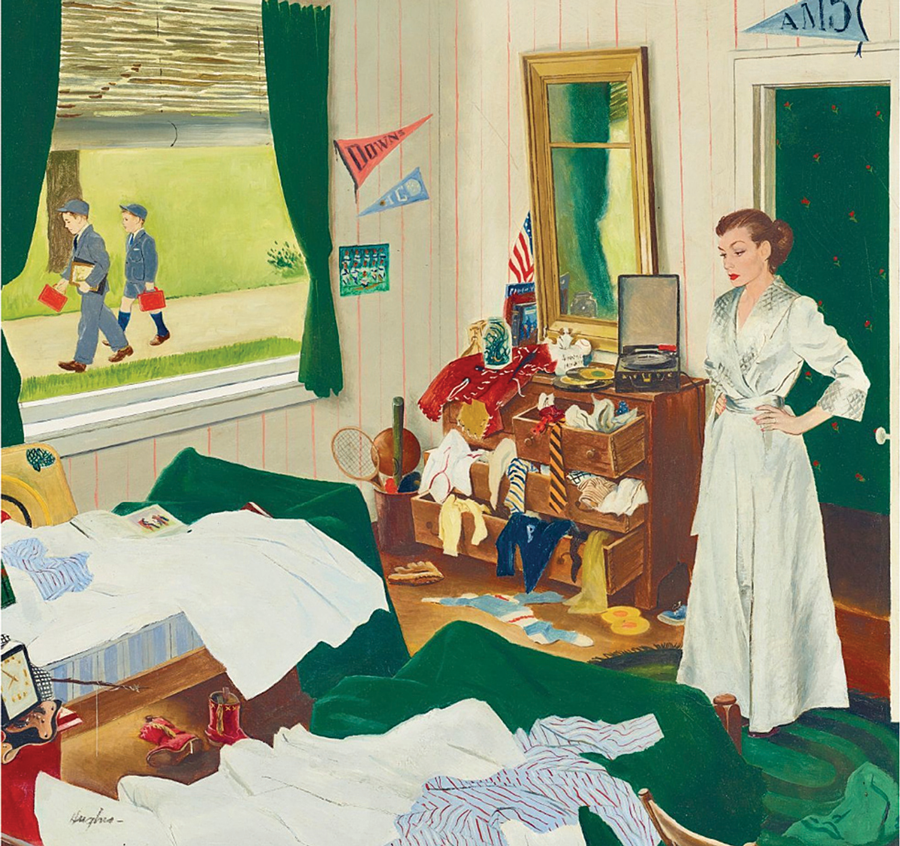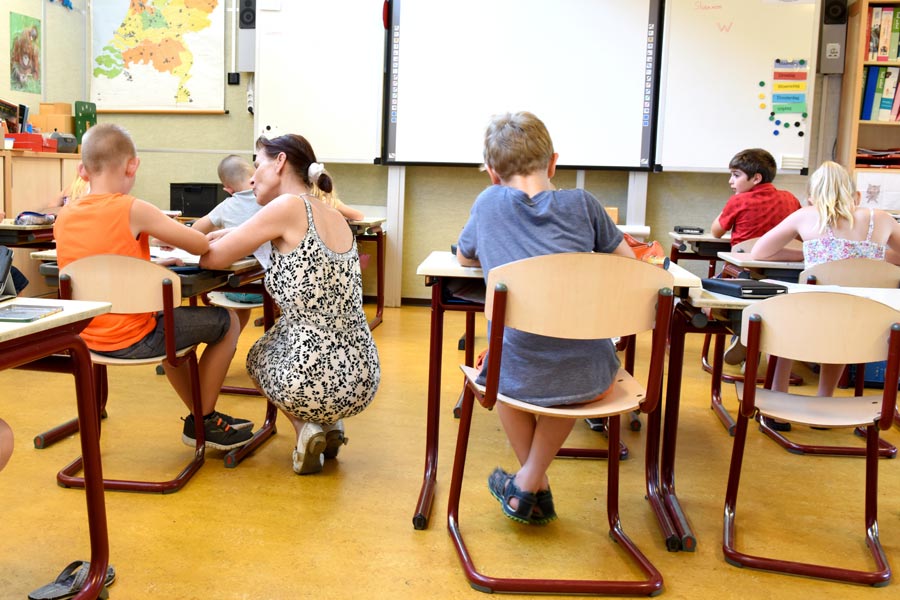By Katie Martin
Who amongst us mothers has not had a mild crisis because we cannot seem to do our simple duty? I am not talking about taking time for ourselves (although yes, we all need this). I am talking about just performing our basic duties: whether housekeeping, child-tending, or homeschooling. Those are my “basics,” and I suspect they are yours too. Yet, some days accomplishing these priorities – even ruthlessly pared down – seems monumental or even impossible. Why?
I have a suggestion to help with getting the basics done. Declutter Your Stuff. Now lest you think I am about to pontificate about the spiritual benefits of a life of poverty and renunciation of material goods, let me assure you I have no such designs on your time. In general, I make it a policy not to opine (out loud) about subjects I know nothing about. Our spiritual fathers and mothers of yore assure us that poverty of spirit is indeed a good thing, and I believe them. (Although I got rid of the one book I had on this subject because there were too many books on that shelf.) Our Lord Himself was born into humble surroundings demonstrating that poverty is for even the best of us.
Here, however, I offer a few seemingly more mundane benefits to having less. Call it minimalism if you like – call it purging, reducing, trimming – whatever allows you to give a fair hearing to the general principle of decluttering items permanently out of your space.
The benefits of decluttering your home are indeed spiritual in nature, but not obviously so. They are certainly hidden to the beneficiary until she experiences them for herself. Among the benefits are these: you will be more able to get the basics done and focus on your priorities. You will gain more time in your day, which will help you be a better mother and will certainly help your homeschooling efforts.
For example, it is our job to feed and water and educate our offspring in a somewhat ordered manner, but some days that amounts to a Herculean task. Many is the morning I think, “I’ll just tidy the breakfast mess before school,” only to discover that somehow eggs and toast has generated two pots, a blender, an empty butter dish, a host of mugs, and more plates than there are people in the family. (I mean, this is before I decluttered the excess plates, ok?) This is all right – food mess is part of life that can’t be eliminated. (Even take-out requires an impressive clean up, which I refuse to understand.)
So now I resolve to deal with the dishes, except I don’t. The breakfast mess is somehow underneath the debris that “lives” in the kitchen – or at least that has settled there overnight. Extra workbooks, a stray pile of laundry, extra straws for water bottles, measuring tapes, the phone charger that only works if you tilt it right, baby toys, appliance manuals, that bottle of glue I was going to salvage, the replacement tent stake that didn’t fit the tent, the toddler’s puzzle, the box of crackers that was gross enough to return but I am not sure it’s worth a twenty minute trip to the store but maybe…
Meanwhile there is a baby grabbing my leg while the six-year-old screams that she can’t find San Francisco on the map, the eight-year-old tries to negotiate downward chores, and the four-year-old demands that she needs her fluffy mittens taken out of storage right.now.no.exceptions. At this moment, you can bet the kitchen is going to be the thing that is put on hold. The dishes are not melting down in my face. Or, ok, maybe unlike me you power through the debris and dishes, and the kids have to wait longer than you would like. But, be real, both tasks can’t happen at once. (And frankly, even those of us who consider ourselves less than empathetic will find the mittens to stem the onslaught of requests, so I bet the kitchen lost that one.) Either way, we want to be able to get through the day without sacrificing the basic duties of motherhood and feeling perpetually behind at our job.
If you are like me, after hours of putting out fires like this, you suddenly realize that you’ve managed to chop through the debris, but the breakfast fallout remains, and now it’s lunch time. You start to feel like just being able to do the dishes would be a treat. You just want to DO YOUR JOB. The job your husband is grateful to you for, the one that separates the barbarian from the Christian wife, and the job you are told by reliable sources that you will have to answer for at your judgment. If holiness is found in doing the dishes, then you need to be allowed to actually DO the dishes! (If I get to the judgment and say I couldn’t reach the sink, is that going to count against me?)
There are a lot of systems out there, and they are well and good if they work for you. Color code your towels if that is your thing. Put baskets on every surface. (Although you will have to declutter those baskets eventually, so don’t kid yourself.) But some of us need an even simpler system. We have many (small) kids, we are attempting many (small) endeavors, and there is a limit to how much detail a growing household can keep up with. But there is one system that can enable you to manage all, or at least most, of the basics without losing your mind. And, I warn you, it is pretty basic itself. That is, you need to reduce the number of items in your home. You have to cut out the debris so that you can do the housekeeping, cleaning, homeschooling, and cooking without having to wade through it all first.
There is one system that can enable you to manage all, or at least most, of the basics without losing your mind. And, I warn you, it is pretty basic itself. That is, you need to reduce the number of items in your home.
The typical American household is drowning in unused or redundant items. If you think you are not a part of that, think again. I bet you are. I have had a minimalist bent for years, and I was shocked one day to discover how out of hand things were getting over here. Life happens, new babies come, illness knocks us down for a few weeks at a time. Sometimes stuff comes into our house without us even realizing. We are victims of an over materialized culture, which as Catholics we recognize as a vaguely spiritual evil, but it could actually be robbing our homes of peace in a very practical way!
Take a look at your stuff and be a little brutal about it. Rethink how you have stored it hitherto. Not every surface needs décor, not every cabinet needs something in it, not every appliance needs to be visible. Every single corner in a given living space doesn’t need to have furniture in it, if you want to get really crazy. Regardless, not everything that once served a purpose in our home still does, and there are some items that were just mistakes to begin with. That’s ok. Declutter them, and don’t look back at the wreckage.
If you are tripping over, and spinning your wheels against the same items every day, it might not be because you are using all the things. It might be that they just find their way onto the floor and counter every day because they exist in your house. Just living there, taunting you for your failure to keep up! No system in the world is going to fix this problem permanently, the way getting rid of stuff will. Declutter and watch how much easier it is to get the basics done. Sheer math tells us fewer things = less time picking things up. You’ll probably still have your fair share of broken crayons and food wrappers, but that’s dirt that you may have the bandwidth to deal with because tidying up doesn’t take all your time. (Like the breakfast mess, dirt is inevitable. No one’s promising Utopia here, just survival and hopefully more peace.)
In some ways homeschoolers have a harder time with purging than others because, notwithstanding the impressive amount of curriculum we are apt to acquire, many of us are naturally DIY-ers, homesteaders, or simply committed to frugal living on one income. Maybe we were even a little suspicious of the integrity of the supply chain long before 2021! We’re scared to let things go.
No. No more! If you want to survive this stage of life, you need to become ruthless with the stuff that comes into your domain. Those homeschool materials that you thought would be the efficient cause to all success but really turned out to be just one more textbook that you don’t use? Ditch it. It’s not serving you; it’s reminding you of past homeschool failures and money badly spent. And it’s one more thing to wade through before you can reach the sink to do the dishes. If you are a homeschooler, and you automatically have that much less time in your day for housekeeping or home making, you need to eliminate the stuff. It is likely standing in your way of doing your duty, of simply getting the basics done. And it might even be causing you to blame your family for your housekeeping handicaps.
Take the leap, ditch the extras. (There’s no law that says everyone is entitled to more than one water bottle, or everyone must have several pairs of mittens or more than two hoodies, or that you have to have an Armageddon-worthy stash of Tupperware even if you got it for free.) Watch your day become a little more open once you purge the excess. Feel your breath slow down. You might even have a minute to sit on the couch and give some emotional energy to the topics that your kids WANT to talk about, fuzzy mittens notwithstanding. In other words, some of us might have more time for empathy, or (if you are ok in the empathy department) housekeeping. But the point is you will be more able to be both a present mom and a decent housekeeper. In other words, you’ll have time for your basic priorities!
And lest you worry that you won’t have enough (insert: clothes, dishes, whatever…) if you downsize, let me assure you: no! The opposite is true. You won’t run out, rather you will actually be able to do the laundry more often and keep up with the dishes faster. You’ll use what you have, but you won’t get behind under the sheer backlog. You probably won’t avoid doing the dishes and laundry because the inventory is simply so much more manageable, and the chore so much less daunting. (Plus, it needs to happen so everyone can be fed and clothed, so… the benefits of urgency.) If we only have a few outfits and one set of dishes, we… use them and reuse them. And come on, when everything is clean, I bet you always gravitate towards a few key favorites anyway! Post purging, housekeeping suddenly becomes far more manageable and less dreadful. You start to keep up better. You FEEL more successful, which helps you BE more successful.
On that note: When you have more peace in your daily routine you may begin to fill in the gaps that exist in your homeschool. Maybe you are drawn to more simplicity and naturally start to pare down your schedule because home is a peaceful place in which to rest. Or maybe more activity is what you need, and you find you actually have the freedom to be flexible with outings because you know you aren’t coming home to a war zone after every play date. The balance will reveal itself amidst the peace.
People tell me my house is clean for the number of small kids I have. Oh friend, there are many, many days that it is not. But I’ll tell you something: it is not cluttered. And that is what people are seeing. (Or maybe they are just not seeing the dirt if, like me, they frequently misplace their single pair of glasses. My sister tells me glasses are not an item to minimize, and she is right.) My great Aunt Floss (who was born in 1912 and had to sleep in the bathtub because her family did not have enough beds, and it was not because her mother decluttered all the beds) told me that she had a dear friend whose house was always clean. Upon questioning her, Aunt Floss’ friend replied, “It’s not clean, it’s neat, and you can get away with a heck of a lot when you are neat, kiddo.”
“It’s not clean, it’s neat, and you can get away with a heck of a lot when you are neat, kiddo.”
Lest you are still worried about starting to declutter, let me assure you: you will make mistakes. Like anything, that is part of the process. But don’t let a couple of mistakes stand between you and your sanity or the success of your homeschool. Don’t let it stand in the way of discovering that you can do your basic job well. In other words, don’t let it stand in the way of finding peace in your vocation. If minimalism (or simply having less) is something you feel inspired by, be patient with yourself as you go through your home room by room, category by category. Even when “finished,” decluttering is an ongoing lifestyle. (See end note on practical tips on where to start decluttering.)
Lastly, consider the monasteries. We mothers are not nuns, but each of us is probably striving for some sort of order and rhythm to our household, perhaps a bit like an abbey. (Not to mention the cleanliness of an abbey, which would be nice.) Author Elizabeth Gouge, in her novel Green Dolphin Street describes just such an atmosphere in a lay home managed by nuns for several years. “And somehow… you could tell that a religious order had the running of this house for many years… and one got the impression that rather too much sunlight and fresh air had been allowed to stream through the inadequately curtained windows over uncarpeted floors that could not fade into well-scrubbed corners where nothing was ever hidden.”
Curtains and carpets aside, (although the lack of them may appeal to the radically minimalist hearts among us) wouldn’t it be wonderful if we could feel a similar way about our own homes? If we could actually feel the air and light in our space, not weighed down by clutter or disheartened by a horizon of debris? If we could see that corner, being lit and now free of items? And while we look, maybe we could even find a moment to curl up in the corner and feel the light on our face as we spend a moment in silence with the One Who was born with no material possessions and for Whose last garment they cast lots.
Practical ideas for the most impactful areas to declutter:
- Clothes (Extras, worn out or out of date, items that no longer fit, wrong season etc.)
- Dishes, Tupperware, and redundant appliances
- Homeschooling materials (half used, not satisfactory, duplicate copies)
- Craft materials for crafts that you don’t actually do. Small kid’s craft materials can be very simple. They are often happy with paper, markers, and a few other basics.
- Toys (large toys and anything from the dollar store)
- Toiletries and personal hygiene items you don’t use
- Anything that causes you repeated stress to look at every day
This article is courtesy of The Latin Mass: The Journal of Catholic Culture and Tradition




